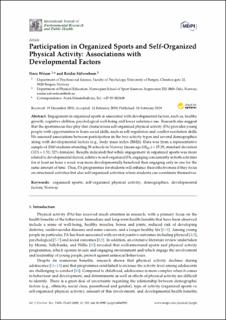Participation in organized sports and self-organized physical activity: Associations with developmental factors
Peer reviewed, Journal article
Published version
Permanent lenke
https://hdl.handle.net/11250/2647152Utgivelsesdato
2019Metadata
Vis full innførselSamlinger
- Artikler / Articles [2096]
- Publikasjoner fra Cristin [1084]
Originalversjon
International Journal of Environmental Research and Public Health. 2019, 16(4), 585. 10.3390/ijerph16040585Sammendrag
Engagement in organized sports is associated with developmental factors, such as, healthy growth, cognitive abilities, psychological well-being and lower substance use. Research also suggest that the spontaneous free play that characterises self-organized physical activity (PA) provides young people with opportunities to learn social skills, such as self-regulation and conflict-resolution skills. We assessed associations between participation in the two activity types and several demographics along with developmental factors (e.g., body mass index (BMI)). Data was from a representative sample of 2060 students attending 38 schools in Norway (mean age (Mage) = 15.29, standard deviation (SD) = 1.51; 52% females). Results indicated that while engagement in organized sports was more related to developmental factors, relative to self-organized PA, engaging concurrently in both activities for at least an hour a week was more developmentally beneficial than engaging only in one for the same amount of time. Thus, PA programmes for students will enhance their effectiveness if they focus on structured activities but also self-organized activities where students can coordinate themselves.
Beskrivelse
This article is an open access article distributed under the terms and conditions of the Creative Commons Attribution (CC BY) license (http://creativecommons.org/licenses/by/4.0/).
